🔥 Popular Free Downloads

THE FULL WORKS
All of our staff training manuals in one handy download!

FREE STAFF HANDBOOK
A totally customisable free staff handbook download.

FREE PROFIT & LOSS CALCULATOR
Keep on top of your expenses with our free profit and loss calculator.
⭐ Popular Resources

SWOT ANALYSIS
SWOT Analysis explained in detail accompanied by a free download.

DOWNLOADS HUB
The place to download all of our free forms, templates & guides.

FREE CASH FLOW CALCULATOR
Download our free template or use our online cash flow calculator.

BAR MANAGEMENT TRAINING
Simple and free online bar and cellar management training.
🔥 Popular Pages
- How to Run a Restaurant
- Awesome Articles
- Managing Your Staff
- Marketing Your Restaurant
- Restaurant Financing and Funding
- Maintaining Neutrality in Pronoun Usage
- Everything You Wanted To Know About Gin
- Safe Cooking Temperatures For Meat
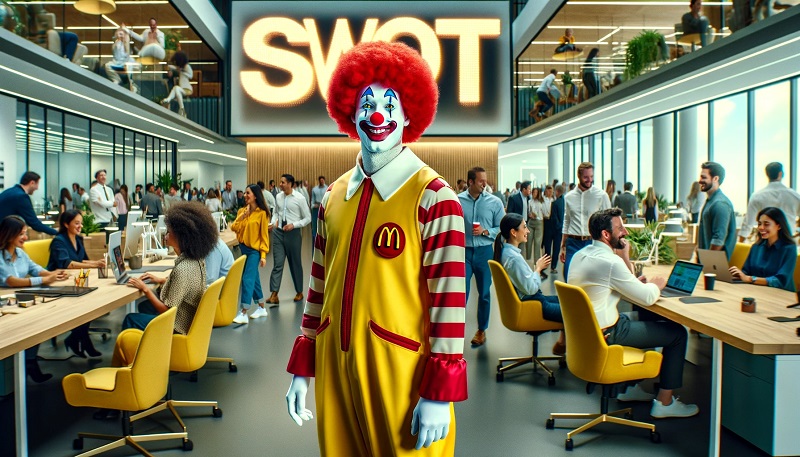
A SWOT Analysis of McDonald's
Written by The Restaurant Doctor UK Team
Last Updated: 4th November 2023
Let's dive into the sizzling world of McDonald's with a SWOT analysis that's as juicy as their Big Macs! Imagine the Golden Arches, more famous than some celebrities, popping up in over 38,000 spots in over 100 countries – that's McDonald's for you, a titan in the fast-food universe.
But wait, there's more to this burger behemoth than meets the eye. Sure, they've got the fast and familiar vibe down, but the behind-the-scenes action is packed with thrills, spills, and a whole lot of business savvy. We're talking strengths that have made them the king of the fast-food hill, weaknesses that lurk like hidden calories, opportunities as tantalising as a fresh fries' scent, and threats that loom like the next health food craze.
So, grab a seat and maybe a snack, as we chow down on the big, meaty details of McDonald's in a SWOT analysis that'll serve up the lowdown on where they stand and what's cooking for their future. It's a rollercoaster ride through the McDonald's empire, with insights more satisfying than a side of nuggets. Ready to take a bite? Let's go!
What’s on this page:
- A Brief History of McDonald’s
- McDonald’s Strengths
- McDonald’s Weaknesses
- McDonald’s Opportunities
- McDonald’s Threats
- Analysis
A Brief History of McDonald’s
From Humble Beginnings to Global Phenomenon
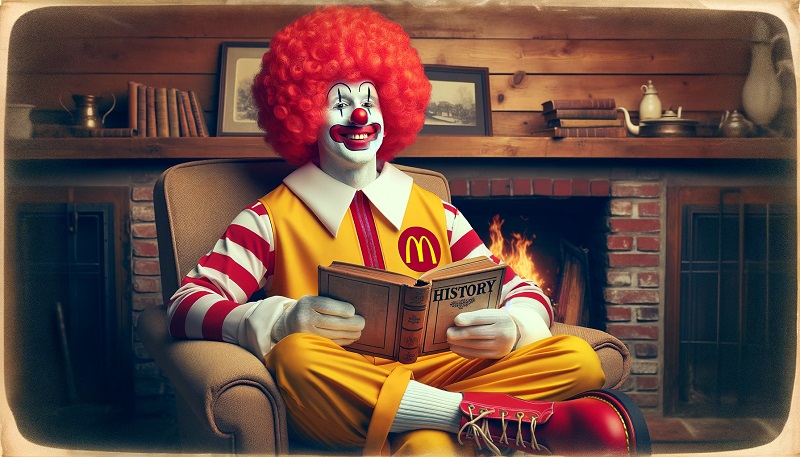
The Birth of a Fast-Food Icon (1940s - 1950s)
In the post-World War II era, in the quiet town of San Bernardino, California, two brothers, Richard and Maurice McDonald, embarked on a culinary revolution that would forever change the way the world dined.
In 1940, they opened a small drive-in restaurant, aptly named "McDonald's Bar-B-Q," serving a limited menu of burgers, hot dogs, and milkshakes. Yet, it wasn't until 1948 that the real magic happened.
The brothers streamlined their operation, introducing a revolutionary concept: the speedee system, where they served up delicious burgers, crispy fries, and refreshing beverages in record time.
This innovative approach laid the groundwork for what would become the iconic McDonald's we know today.
Golden Arches Go Global (1960s - 2000)
With the 1960s came a turning point for McDonald's. Ray Kroc, a visionary businessman, joined the brothers and transformed their local success into an international phenomenon.
Kroc opened the first franchised McDonald's restaurant in Illinois in 1955, setting the stage for rapid expansion. The introduction of the famous Golden Arches in the 1960s solidified McDonald's status as a global brand.
Over the decades, the menu evolved to cater to diverse tastes worldwide, with region-specific items like the McSpicy Paneer in India and the Teriyaki Burger in Japan.
The New Millennium (2000 - Present)
As the new millennium dawned, McDonald's continued its journey of innovation. In the 21st century, the company embraced digital technology and introduced self-order kiosks and mobile app ordering, making it even more convenient for customers to enjoy their favourite meals.
Additionally, McDonald's has made significant strides in sustainability, committing to environmental initiatives like reducing plastic waste and sourcing more sustainable ingredients.
Despite the challenges posed by changing consumer preferences, McDonald's remains a global force, serving millions of customers every day while continually adapting to meet the evolving demands of a modern world.
With its enduring legacy, McDonald's stands as a symbol of convenience, affordability, and the enduring power of a simple, delicious meal.
McDonald’s Strengths
Alright, let's break down the super-sized strengths of McDonald's, where the Golden Arches reign supreme in the fast-food kingdom!
Picture this: billions of people, all over the globe, have fallen head over heels for McDonald's. It's not just about munching on fries; it's a love story with the Big Mac. Those Arches aren't just a logo; they're a symbol of yum in our tummies, and Ronald McDonald isn't just a clown; he's practically family. That catchy "I'm lovin' it" tune? It's the soundtrack to countless meals across the planet.
Now, McDonald's doesn't just sit back and bask in its fame. Oh no, they're out there conquering the world, one Happy Meal at a time. With a jaw-dropping 39,000 locations playing the hits in over 100 countries, McDonald's is like the rockstar of fast food that knows exactly how to charm its fans, whether it's with a spicy curry burger in India or a classic cheeseburger in the States.
What's their secret sauce, you ask? It's a recipe that mixes the same great taste you can count on, whether you're in Paris, Texas or Paris, France, with the speedier-than-a-speeding-bullet service, and prices that make your wallet as happy as your belly. They've been zipping around the fast-food track, lapping everyone else for ages. Drive-thru? They've got that. New McFlurry flavours? They're on it.
McDonald's is like that reliable friend who's always there when you need them, ready with a McNugget in one hand and a value meal in the other. It's the hangout spot, the quick bite before soccer practice, and the treat after a long day. And that's why, from the corners of Cairo to the streets of San Francisco, McDonald's isn't just a restaurant; it's a global phenomenon that keeps the world coming back for more.
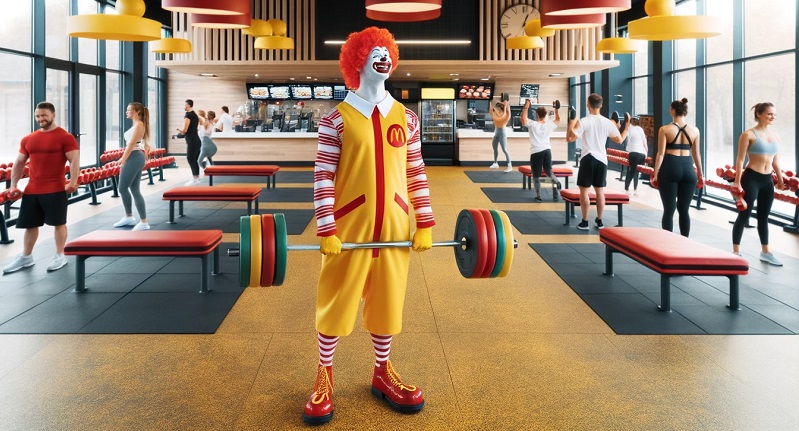
What are McDonald’s Strengths In Our SWOT Analysis?
Strong Global Presence and Brand Recognition
- McDonald's operates in more than 100 countries with over 38,000 restaurants worldwide.
- It ranks 9th in Forbes' list of World's Most Valuable Brands 2022, with a brand value of $47.1 billion.
- McDonald's serves around 69 million customers daily (that works out at 799 per second)!
Wide Menu Variety and Innovation
- Offers a diverse menu that includes breakfast items, salads, and regional specialties such as the McArabia in the Middle East.
- Consistently introduces new items to meet customer demands, like the recent addition of plant-based burgers in some locations.
- Collaborates with celebrities to create unique menu items, such as the Travis Scott meal in the U.S.
Efficient Supply Chain Management
- McDonald's utilises a global network of suppliers ensuring consistent quality across all locations.
- Uses technology to optimise its supply chain, reducing costs and increasing efficiency.
- Regularly audits suppliers to ensure compliance with quality standards and ethical practices.
Well-Established Franchise System
- McDonald's franchise model constitutes 93% of its restaurants worldwide.
- The franchise system provides a significant revenue stream, with McDonald's earning revenue from rent, royalties, and fees.
- Franchisees are provided with training and support, ensuring consistent quality and service.
Marketing and Advertising Prowess
- McDonald's allocated $450 million for advertising in the U.S. alone in 2020.
- Known for iconic advertising campaigns such as "I'm Lovin' It".
- Leverages social media and digital platforms to engage with customers.
Strong Financial Position
- McDonald's generated approximately $23.2 billion in revenue in 2021.
- Its net income stood at about $7.5 billion in 2021.
- This strong financial position provides the necessary capital for innovation and expansion.
Established Partnerships
- Collaborates with various food and beverage companies to offer a diverse menu.
- Partnerships with celebrities and influencers for promotional campaigns.
- Strong relationships with franchisees, suppliers, and other stakeholders.
Robust Customer Loyalty Programs
- McDonald's loyalty program "MyMcDonald's Rewards" allows customers to earn points for purchases.
- Regular promotions and deals to reward loyal customers.
- Personalised offers through its mobile app to enhance customer experience.
Real Estate Holdings
- McDonald's owns prime real estate worldwide, with a significant portion of its revenue coming from rent paid by franchisees.
- Strategic location of restaurants is a key aspect of its business model.
- McDonald's real estate holdings are estimated to be worth over $30 billion.
McDonald’s Weaknesses
Alright, let's flip the burger and check out the other side — the weaknesses of McDonald's that aren't as tasty as their fries.
Sure, McDonald's is a giant, but it's not always a gentle one. Picture this: beneath those shiny Golden Arches, there's a storm brewing. Some see that big, bright M and think of happy meals and good times, but others? They see a red flag for junk food and a not-so-green company. From Super-Sized controversies to a McFlurry of lawsuits, McDonald's has been grilled for serving up a side of health and environmental woes.
Critics are like drive-thru dietitians, environmental warriors, and fair work fighters, all questioning the McMenu's nutrition, the toys in Happy Meals, and even the McUniforms. They've dished out some serious McScandals, claiming the brand is as interested in green practices as a fry is in a ketchup shortage.
So, what's the plan? McDonald's has to show it's not just flipping burgers but making a McChange. It's about slicing up the bad stuff, like too much plastic, and serving a helping of the good, like better ingredients and happier employees. They've got to talk the talk, walk the walk, and make sure everyone knows they're doing it.
But let's be real: changing up the recipe at McDonald's is tougher than a well-done Quarter Pounder. With a worldwide web of restaurants to run, keeping everyone lovin' it while shifting gears is no small fry. It's a McJuggling act that needs some serious skills to keep those registers ringing and the future looking as bright as their neon signs.
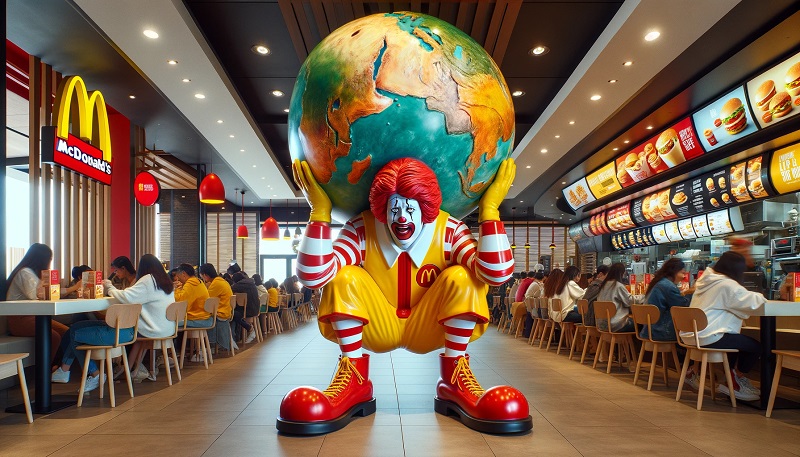
What are McDonald’s Weaknesses in our SWOT Analysis?
Dependence on a Limited Menu
- Core offerings such as the Big Mac, fries, and McNuggets dominate sales.
- These flagship products are susceptible to market fluctuations and changing consumer trends.
- McDonald's needs to innovate to reduce dependency on these core items.
Negative Health Perceptions
- Criticised for its role in global obesity and health problems.
- A study published in BMC Public Health indicated that fast food consumption is linked to higher calorie intake and obesity.
- The brand faces pressure from health advocacy groups and governments to offer healthier options.
Vulnerability to Changing Consumer Preferences
- The shift towards healthy eating can affect McDonald's sales.
- A 2021 survey by FMCG Gurus found that 65% of global consumers are looking to improve their diet.
- The brand needs to adapt its menu to cater to this growing demand for healthier options.
Employee Turnover and Labour Issues
- The fast-food industry has one of the highest employee turnover rates, and McDonald's is no exception.
- Labour disputes and calls for higher wages can affect operations and brand image.
- Investing in employee training and development can help mitigate these issues.
Standardisation vs. Local Preferences
- While standardisation is key to McDonald's success, it may not always meet local tastes.
- Customising the menu to local preferences can sometimes be a challenge.
- Balancing standardisation with localisation is crucial for global appeal.
Historical Controversies
- McDonald's has faced various controversies, from labour practices to environmental concerns.
- These controversies can have a lasting impact on the brand's reputation.
- Addressing these issues proactively is essential to maintaining a positive brand image.
Perception of Low-Quality Ingredients
- Some consumers perceive McDonald's food as being low-quality and overly processed.
- The brand has made efforts to improve ingredient quality and transparency.
- Continuing to address these perceptions is important for customer satisfaction.
Pricing and Value Perception
- McDonald's faces competition from both fast-food and fast-casual restaurants.
- Price wars with competitors can affect profitability.
- Balancing price and perceived value is a constant challenge.
Reliance on Franchisees
- McDonald's relies on franchisees to maintain service and quality standards.
- Issues with franchisees can affect the brand's reputation and customer experience.
- Regular training and support for franchisees are necessary to uphold McDonald's standards.
McDonald’s Opportunities
McDonald's isn't just about Happy Meals; it's a major player in the fast-food game, always ready to jump on the next big thing. Think of McDonald's like a seasoned surfer, eyeing the biggest waves to ride into the future. The fast-food seas are getting wild, with customers wanting more than just a quick bite—they're after experiences, Instagram-worthy moments, and food that fits their TikTok trends.
Here's where the Golden Arches could really shine. With its name known from Nashville to Nepal, McDonald's has the muscle to push into new territories—imagine McSushi in Japan or McBiryani in India. It's about cooking up a storm with fresh flavours and saying, "See you!" to the same old, same old.
But wait, there's more. McDonald's could sprinkle a little digital magic on everything, from how we order to how we pick up our food. They're not just flipping burgers; they're flipping the entire experience, with apps that know you're craving a McFlurry before you do.
Let's not forget going green. McDonald's could lead the pack by cutting back on waste like a ninja with packaging that's as earth-friendly as a plant-based Big Mac. It's all about catching the eye of the eco-friendly crowd who wants their fries with a side of clean conscience.
McDonald's has a shot at not just keeping up but setting the pace, turning every opportunity into a home run. By staying alert and nimble, McDonald's can keep dishing out smiles, one sustainable, tech-savvy, and mouth-watering innovation at a time. And as the world spins and appetites change, those Golden Arches can be a beacon of what's next in fast food, ready to welcome everyone to tomorrow's flavours, today.
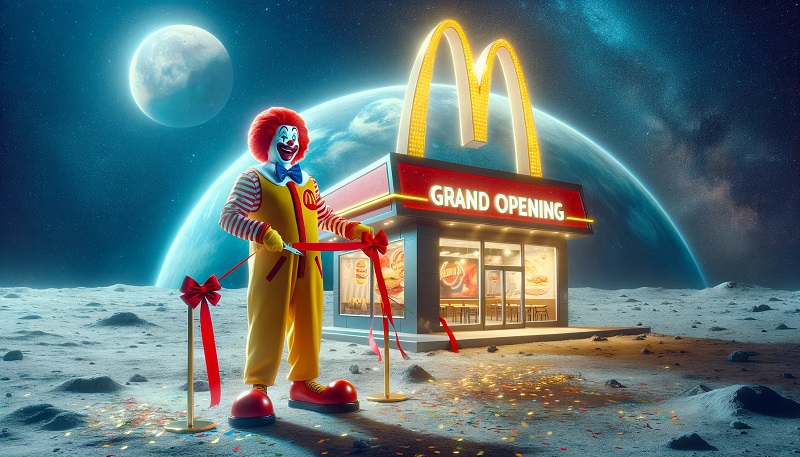
What are McDonald’s opportunities in our SWOT Analysis?
Expanding into Emerging Markets
- The fast-food industry in emerging markets such as Asia and Africa is projected to grow significantly.
- These markets offer vast potential with rising middle-class populations and urbanisation.
- A successful expansion can significantly boost McDonald's growth and profitability.
Healthier Menu Options and Sustainability
- Offering healthier alternatives such as salads, low-calorie options, and plant-based products can cater to health-conscious consumers.
- Adopting sustainable practices, like sourcing local ingredients and minimising waste, can enhance McDonald's brand image.
- A 2021 survey by IBM found that 77% of consumers consider sustainability important.
Digital Transformation
- Investing in digital technologies such as mobile ordering, delivery apps, and kiosks can improve customer convenience.
- McDonald's can leverage AI and machine learning to personalise customer experiences.
- Digital platforms can also provide valuable data to inform business decisions.
Diversification
- Acquiring or partnering with other food and beverage brands can diversify McDonald's product offerings and revenue streams.
- This can also provide cross-promotional opportunities and access to new customer bases.
- Diversification can reduce dependency on core products and mitigate risks.
Sustainable Practices
- Adopting eco-friendly packaging and sustainable sourcing practices can improve McDonald's environmental impact.
- This can also align McDonald's with global sustainability goals and consumer expectations.
- McDonald's can also invest in renewable energy sources for its restaurants.
Plant-Based Options
- The global plant-based food market is expected to reach $74.2 billion by 2027, according to a report by Meticulous Research.
- Offering plant-based burgers, nuggets, and other products can attract vegan and vegetarian customers.
- Collaboration with plant-based brands can also enhance McDonald's menu offerings.
Innovation
- Continued product development and innovation can keep McDonald's menu fresh and relevant.
- Innovation can also extend to packaging, service delivery, and marketing campaigns.
- This can help McDonald's stay ahead of competitors and meet evolving customer expectations.
Data Analytics and AI
- Leveraging data analytics and AI can improve operational efficiency, from inventory management to customer service.
- AI can also be used to personalise customer interactions and marketing messages.
- McDonald's can use data insights to make informed business decisions and optimise its offerings.
McDonald’s Threats
In the cutthroat world of burgers and fries, McDonald's stands at a crossroads. With competitors popping up like mushrooms after rain and the economy riding a rollercoaster, McDonald's is feeling the heat. Plus, it's not just about selling Big Macs anymore—people want their meals quick but also with a side of health and sustainability. It's a tall order, but McDonald's needs to stay on its toes to keep its golden arches shining bright.
The fast-food jungle is brimming with contenders. Everyone wants a piece of the pie—or, in this case, the burger. McDonald's can't just rest on its laurels; it needs to whip up some fresh, zesty ideas to keep diners coming back for more. That's getting trickier as customers swap fries for quinoa and demand eco-friendly packaging.
But it's not all about what's on the menu. McDonald's has to dance to the tune of fluctuating ingredient costs, ever-tightening regulations, and the scary possibility of a global financial slump—all of which could turn profits as flat as day-old soda. The stakes are high, and one wrong move could see its reputation grilled and served up for scrutiny.
Surviving this gauntlet of threats takes more than luck; it takes a master plan. McDonald's must keep its eye on the prise, predicting pitfalls and dodging them with the grace of a burger-flipping ninja. If it can do that, the future could be just as tasty as its fries.
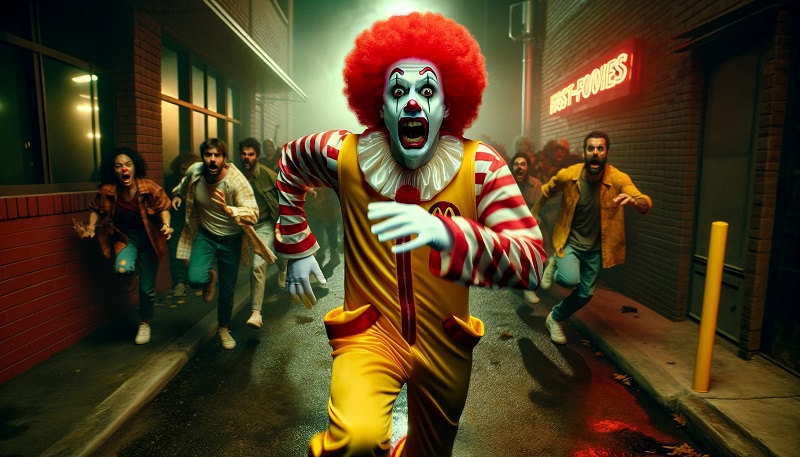
What are the threats to McDonald’s in our SWOT Analysis?
Intense Industry Competition
- The fast-food industry is crowded with numerous global and local players such as KFC, Burger King, and Subway.
- McDonald's needs to continually innovate and offer value to retain its market share.
- Effective marketing and menu diversification are key to staying competitive.
Health and Nutrition Regulations
- Governments worldwide are implementing stricter health and nutrition laws, such as mandatory calorie labelling and restrictions on advertising to children.
- Failure to comply with these regulations can result in fines and damage McDonald's reputation.
- McDonald's needs to adapt its menu and marketing strategies to align with these regulations.
Fluctuating Commodity Prices
- Variations in the prices of key commodities such as beef, chicken, and potatoes can affect McDonald's costs.
- McDonald's may need to adjust its pricing or absorb the costs, affecting profitability.
- Hedging strategies and contracts with suppliers can mitigate the impact of price fluctuations.
Public Relations Challenges
- McDonald's needs to address environmental concerns, such as deforestation and waste generation.
- Social responsibility initiatives, such as ethical sourcing and community involvement, can enhance McDonald's image.
- Transparency and communication are key to handling public relations challenges.
Global Economic Downturns
- Economic recessions can impact consumer spending, affecting McDonald's sales and profitability.
- McDonald's may need to offer promotions and value deals to attract budget-conscious customers.
- Diversifying the menu and expanding in emerging markets can also mitigate the impact of economic downturns.
Changes in Labour Laws
- New labour laws and minimum wage regulations can increase McDonald's operational costs.
- McDonald's needs to balance labour costs with the need to provide competitive wages and benefits.
- Investing in technology, such as self-service kiosks, can also help manage labour costs.
Consumer Advocacy
- McDonald's must address concerns from consumer advocacy groups and activists, such as those related to health, environment, and labour practices.
- Engaging with these groups and implementing changes can improve McDonald's image and customer trust.
- Failure to address these concerns can result in negative publicity and potential boycotts.
Cybersecurity Threats
- With increasing digitalisation, McDonald's needs to invest in cybersecurity measures to protect customer data.
- Data breaches can result in significant financial losses and damage McDonald's reputation.
- Regular audits, employee training, and robust security protocols are essential to mitigate cybersecurity threats.
Analysis
McDonald's is perched on the edge of tomorrow, armed with a legacy as mighty as its Big Mac and a reach that spans the globe. It's a titan in the realm of quick bites, with a menu as varied as the countries it serves and a bank account that backs bold moves into new culinary territories. But the world of fast-food never stands still, and neither can McDonald's. To keep its crown, it must pivot with the times.
As modern munchers clamour for digital convenience and food that feeds the body and the conscience, McDonald's is poised to deliver, powering up its tech game, greening its operations, and sprouting a garden of healthier eats. Yet, in this race to the future, it can't trip over the basics—fair prices and good grub are the foundation stones of its empire.
Facing down the dragons of changing markets, stringent laws, and the ever-looming threat of economic storms, McDonald’s must chart a course with strategic savvy. Smart risk management isn't just a nice-to-have; it's the armour McDonald's needs to fend off the slings and arrows of an unpredictable world.
Armed with deep pockets, a taste for innovation, and a dash of foresight, McDonald’s is well-equipped to feast on opportunity and starve off threats. But to dine in the halls of eternal fast-food fame, it must stay sharp, swift, and always a step ahead. With eyes wide open to the challenges and hands steady on the grill of progress, McDonald's isn't just playing to stay in the game—it's playing to win.
You may also like...
Restaurant SWOT Analysis Explained and Free Download
Unlock your restaurant's full potential by identifying its strengths, weaknesses, opportunities, and threats with a comprehensive SWOT analysis. This invaluable tool can guide you towards strategic decision-making and long-term success in the competitive dining industry.
Don't miss out on this opportunity to enhance your restaurant's performance – click here to start your journey towards growth and success.